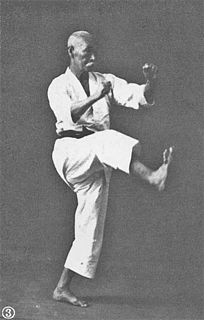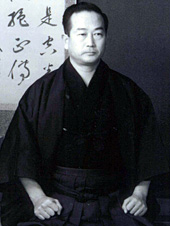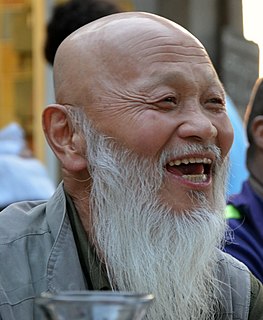Related Research Articles

Karate (空手) is a martial art developed in the Ryukyu Kingdom. It developed from the indigenous Ryukyuan martial arts under the influence of Chinese martial arts, particularly Fujian White Crane. Karate is now predominantly a striking art using punching, kicking, knee strikes, elbow strikes and open-hand techniques such as knife-hands, spear-hands and palm-heel strikes. Historically, and in some modern styles, grappling, throws, joint locks, restraints and vital-point strikes are also taught. A karate practitioner is called a karateka (空手家).

Shotokan is a style of karate, developed from various martial arts by Gichin Funakoshi (1868–1957) and his son Gigo (Yoshitaka) Funakoshi (1906–1945). Gichin Funakoshi was born in Okinawa and is widely credited with popularizing "karate do" through a series of public demonstrations, and by promoting the development of university karate clubs, including those at Keio, Waseda, Hitotsubashi (Shodai), Takushoku, Chuo, Gakushuin, and Hosei.
Japan Karate Association is one of the oldest global Shotokan karate organization in the world.

Masatoshi Nakayama was an internationally famous Japanese master of Shotokan karate. He helped establish the Japan Karate Association (JKA) in 1949, and wrote many textbooks on karate, which served to popularize his martial art. For almost 40 years, until his death in 1987, Nakayama worked to spread Shotokan karate around the world. He was the first master in Shotokan history to attain the rank of 9th dan while alive, and was posthumously awarded the rank of 10th dan.
The Karate Union of Great Britain, or KUGB, is an association of Shotokan Karate clubs and Karateka operating across Great Britain, with some oversea affiliations. The 1960s saw a growth in the popularity of Karate, and the KUGB was founded in 1966 to be a democratic, not-for-profit organisation, and was the first single style organisation within the UK. Many other British Shotokan Karate organisations have since formed after splitting from the KUGB. The KUGB is currently affiliated to the European Shotokan Karate Association (ESKA) and the World Shotokan Karate Association (WSKA).
Hirokazu Kanazawa was a Japanese teacher of Shotokan karate. He was the Chief instructor and President of the Shotokan Karate-Do International Federation, an organisation he founded after he left the Japan Karate Association (JKA). Kanazawa was ranked 10th dan in Shotokan Karate.
Frank Brennan, is a Shotokan karateka born on 6 May 1960 in the City of Liverpool. He was a British karate champion in the 1970s and 1980s, winning a wide variety of titles both as an individual and as part of the KUGB team. He remains a well-known and well-respected KUGB instructor and coach.

Dave Hazard is a British 7th Dan Karateka and instructor of Shotokan karate and was one of the few students present at the very beginning of British Karate. He is a former KUGB national champion and British team member. Like many of the early karateka he first trained in judo before starting karate in 1969 at the Blackfriers club in London, where he trained under Keinosuke Enoeda, Hirokazu Kanazawa, Kato and Takahashi.

Takayuki Mikami is a Japanese master of Shotokan karate based in the United States of America. He holds the rank of 9th dan black belt in the art, awarded under the Japan Karate Association. In 1958, Mikami tied for first place in the All Japan Karate Championships. The following year, he became the All Japan champion in kumite (sparring) as well as kata (patterns). In 1961, Mikami won first place in kata again. He was also the first person to graduate from the Japan Karate Association's (JKA) instructor training program instituted by Gichin Funakoshi and Masatoshi Nakayama.

Kenkojuku is a style of Shotokan karate previous to the establishment of the Japan Karate Association (JKA) style. It was founded by Tomosaburo Okano. Kenkojuku karate is similar to the teachings of Gichin Funakoshi and modifications made by Funakoshi´s son Yoshitaka Funakoshi. JKA Shotokan differs slightly in that it was Masatoshi Nakayama's version of Shotokan. Okano's/Yoshitaka's Kenkojuku karate and JKA karate are becoming more similar compared to other variants of Shotokan karate such as Shigeru Egami's Shotokai, Hirokazu Kanazawa's Shotokan Karate International or SKI.
Andy Sherry is one of the most senior British practitioners of karate and the retired chief instructor of the KUGB.
JKA England (JKAE) is the official Japan Karate Association (JKA) organisation for Shotokan karate in England and Wales.

Keinosuke Enoeda was a Japanese master of Shotokan karate. He was a former Chief Instructor of the Karate Union of Great Britain. Enoeda was ranked 8th dan in Shotokan karate, and was widely renowned as a formidable karateka. Following his death, Enoeda was posthumously awarded the rank of 9th dan.
James Yabe is a Japanese-American martial arts instructor, and author. One of the oldest students of Hidetaka Nishiyama starting in 1961, Yabe is considered one of the great instructors of Japanese traditional Shotokan Karate.

Hiroshi Shirai is a Japanese master of Shotokan karate. He is the founder of the Istituto Shotokan Italia, a subdivision of FIKTA and of the SCI. Shirai holds the title of Shihan and is responsible for taking the dan examinations within SCI and, together with Carlo Fugazza, for those within the FIKTA.

Hideo Ochi is a Japanese master of karate. He is ranked 9th Dan, and is a former Japan Karate Association (JKA) World Champion in kumite (sparring) and kata (patterns). He was also coach of the German national team and Chief Instructor for JKA Europe. In 1997, he received the Order of Merit of the Federal Republic of Germany.
Japan Shotokan Karate Association (JSKA) is one of the fastest growing Shotokan Karate associations in the world, founded by Keigo Abe in 1999. Abe was a former instructor graduate of the Japan Karate Association and trained and taught at the JKA Headquarters for nearly 35 years. He held a number of senior positions within the JKA and latterly the Matsuno section of the JKA. He had been a senior student of Nakayama and as such the teachings of Nakayama remain an integral part of the evolution of the Shotokan style within the JSKA. Abe Sensei died on the 20th of December 2019.

Masahiko Tanaka is a Japanese master of Shotokan karate. He won the first of his two IAKF world championship Kumite titles in 1975, was part of the Japan team to win the team Kumite title in the third IAKF world championship and was twice JKA All-Japan kumite champion. He became the national coach of Denmark in 1975 and in 1978 returned to Japan where he currently manages the international affairs of the JKA.
Stan Schmidt was a South African master of Shotokan karate. Along with others, such as Norman Robinson, he was an early practitioner of Shotokan karate in South Africa and his establishment of the South African branch of the Japan Karate Association (JKA) in 1965 after training in Japan, along with his subsequent promotion of the art in South Africa, earned him the appellation of 'The Father of South African Karate'. In 1963, he was one of the first westerners to be invited into the JKA's famous Instructor Class in the Tokyo Honbu dojo and he was later one of four non-Japanese karateka to sit on the JKA's international Shihankai. He was also the first non-Japanese karateka to attain 7th dan from the JKA and also the first to attain 8th dan. Today, he is the highest ranking non-Japanese karate master of that organization. He is also known for his acting roles in several martial arts films of the 1970s and 1980s.
References
- ↑ "www.theshotokanway.com". www.theshotokanway.com. 1943-07-09. Retrieved 2013-08-02.
- ↑ Two other individuals from the United Kingdom had already been awarded their blackbelts by the Japan Karate Association before 1966: Charles Mack was graded 1st Dan Shotokan by Masatoshi Nakayama on March 4, 1962 in Japan; and Vernon Bell was ratified as a JKA blackbelt on February 5, 1964 having corresponded with the JKA in Tokyo and relinquished his Yoseikan grade.
- 1 2 UK Karate history Archived 2014-02-23 at the Wayback Machine
- ↑ Club History of Blackpool and Wyre Karate